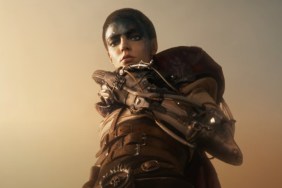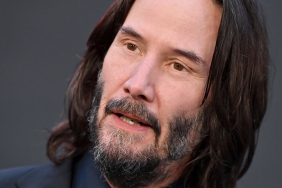
While many of France’s film exports might be hit or miss among American audiences, one thing that the youth of both countries share is that they both seem to love electronic dance music (aka EDM), and that may be one of the best selling points for the latest from filmmaker Mia Hansen-Love, Eden, a portrait of the burgeoning French dance scene during the early ‘90s and how it evolved into the music’s popularity today.
Mia Hansen-Love’s early films got attention in her native France, but she started making bigger waves outside of her country with her semi-autobiographical festival favorite Goodbye First Love in 2011. In the meantime, her older brother Sven was a successful DJ in France at the height of the ‘90s dance movement and got to see its growing popularity as it was happening. It’s his life that forms the basis for Eden, which follows the rise of a young French DJ named Paul (Felix de Givry) as his DJ duo named “Cheers” start to find success in the French party scene. It also watches Paul botch his relationships with women from his college days through adulthood with the likes Greta Gerwig and the fantastic Belgian actress Pauline Ettiene playing love interests at different points in his career.
Ironically, one of the early acts to break out from that French electronic dance scene was Daft Punk who achieved even more mainstream success in 2013, shortly before the completion of the film, which includes a few funny scenes with the two actors meant to represent them.
Having seen the film a couple times during festival season last September, ComingSoon.net had a chance to talk to Mia and Sven while they were in New York to present the movie at the 52nd New York Film Festival. (Interesting note: Mia also happens to be married to ComingSoon.net fave French director Olivier Assayas—something this writer didn’t realize until right before starting the interview.)
ComingSoon.net: Obviously, this story was based on Sven’s life and career as a DJ, so can you talk about how you decided to translate into a film and is this something you’ve been wanting to do for a long time?
Sven Hansen-Love: A few years ago, like three or four years ago, Mia had done three films and she was looking for new inspiration, and she wanted to do something in France. She was looking for some new ideas, something refreshing, and then she thought about doing a film that would be a little based on my memories but also her memories but also about the music and that generation. It was very challenging for her—she would say the same thing. At that time, I wasn’t doing anything. I was at a part of my life where I was just finishing as a DJ, so it was exactly the right time when she suggested that to me. I liked the idea, of course, and then we started talking about it for quite some time. I think that’s how it all started.
Mia Hansen-Love: Yeah, and I started to interview you and take notes on the story based on Sven’s story as a DJ, but then I realized that the first years I hadn’t written as much because I was too young. I’m seven years younger than Sven, and I took a book and I started to ask him about his experiences, his memories of that time, you know, the very first years, like 1991, ’92, when he started. I would ask him, “How do you start listening to this music? Who made you want to listen to garage? What were the parties (like)? Who were your friends?” Sven started to tell me abut this time, the time I hadn’t witnessed. I started going out to his parties very early but still when I was 10, 11 or 12 I wouldn’t go with him. The more I took notes from his memories, the more I realized how interesting it was, and it made me want to make a film that perhaps would have some kind of epic quality. That was something weird and unconscious to do actually, because I knew it was going to be a very expensive film because of the rights for the music and the many locations. I also knew that I didn’t want to work with a big star to play the main parts. It was unconscious because I should have known that this film was impossible to finance. You don’t make a film for 15 million Euros in France without famous actors and based on a story that’s not a success story. But still I was so fascinated about it and it was so stimulating that I went with this and I asked Sven to start to write with me. The more it went, the more involved it was in the writing. We wrote this film that was a two-part film, like two parts: “rise and fall” and we were serious about making it this way. We tried to get it financed for a year until we realized that we had to make the script shorter if we want to have a chance to make this film.
CS: I was going to ask whether Sven did as much drugs as the character does in the movie, because it would be amazing that he remembered half of what happened.
Mia: (laughs) There were many times he was telling me, “I don’t remember that.”
Sven: Actually, there were many things I forgot that people told me, like the first rave scene in that place. Many people remembered it, but I wasn’t even sure I was there.

CS: Since you had witnessed some of these events yourself, when you were interviewing Sven, did you ever have to say, “No, that’s not how it happened”?
Mia: Not when he was talking about the first year because I wasn’t there, but then when we started talking about the years from 1994-5, that’s where I also started to be there. Especially in the first years, I was there at every single “Cheers” party he was doing. That’s when it became very funny because we started to share our memories, and sometimes, yes, I did recall some people or moments he had forgotten. Most of the time, it was him reminding me, because he obviously spent much more in these places and in this world than me. Most of the time it was him telling me stuff I had forgotten, but sometimes, there were some moments or anecdotes that I made him recall. Sometimes it’s some kind of psycho-analysis to make films for some people. Even more here because there was something cathartic about making the film for the both of us, but for different reasons.
CS: I’m surprised there wasn’t a character representing you in the movie
Sven: Yes, there is, at the beginning. It’s a very small part.
Mia: You know, in the beginning, he’s coming to his mother’s place and there’s this girl, his younger sister, and he gives her a CD and asks her to find the notes for him. That’s something that actually happened, that specific track “Sweet Harmony.”
CS: Oh, right. Well then I’m surprised you gave yourself such a small role in his story.
Mia: Yeah, yeah, it was very small, it’s true. There was no real reason to make it… I mean, it was symbolically important that I was there are at some point, but I didn’t feel the interest of being more important than that. It was really a portrait of him and his path, his sentimental life and his past as a DJ. It wasn’t really much about the family.
CS: I think it’s a really good representation of the scene because while that was happening in France, a lot of that music was being imported here through Astralwerks, but we never knew very much about the artists making those records.
Sven: Right, especially Daft Punk.
CS: Some people might go see the movie just for Daft Punk, so do you think they’ll be disappointed that it’s not really about them?
Mia: I don’t really care about that. I do think some people might see the film because of that and be disappointed. We never tried to overplay their presence in the film. We actually tried to do the opposite, just because we wanted to avoid that, but the thing is that the attraction to them and their aura is so strong that as soon as you put the name or a picture, you can be sure that picture will be everywhere. You can’t really resist it, but at some point, you have to accept it. The attraction is so powerful. I just hope that when people see the film at some point, they forget they were going to see a film about Daft Punk and they just see the film for what it is.
CS: They’re almost a running joke because they keep showing up at parties and not being able to get in.
Sven: Which is a true story…
Mia: That they told us.
CS: It’s especially funny when they show up at a costume party early in the movie not wearing costumes…
Mia: They told us that they’ve already been (doing that) because they don’t look cool enough. I do think they do look very cool, but for some reason, they told us that because of the way they’re dressed, there’s something about them that (doesn’t get them into the clubs).

CS: I want to talk about Felix, the actor who plays Paul and carries the movie. He hasn’t done much stuff before this.
Mia: No, he’s starting and he doesn’t yet consider himself as an actor, because he’s not profession, but I think for me he’s an actor now because he’s made this film. I do think he’s going to make other films after it, because he’s extremely talented. But it’s true. When he made this film, he was 20 or 21, and the only thing he had done before as an actor was appearing a few seconds in Olivier Assayas’ film “Something in the Air” but Olivier had seen him for this film and he hesitated between him and another actor, the one who got the main part. The casting director who did Olivier’s film and worked on my film as well remembered him very well because of how natural he was as an actor, even if he wasn’t professional, but also because of his presence. She showed the test screening to me and I was very impressed by him and the fact that there was something really right about him to play Paul. Then I realized that he was very involved in the music scene himself. He has a label and produces music and has a deep interest for electronic music, and I couldn’t imagine making this film with someone who would just show up the day of the shooting, do the job then disappear. It was really special. This character was there in every single scene and it needed so much energy and passion to make this film that I needed somebody who had a real relationship to the music, and Felix has that.
CS: When I saw “Eden” it reminded me a lot of “Something in the Air” and I literally didn’t know until 15 minutes ago that you are married to Olivier. I’m interviewing him on Wednesday and was going to ask if he had seen this movie because I thought he might enjoy it.
Mia: Yeah, he was the first to see it actually. It did play an important role for me in the process of this film, because I think it was when I watched his film that it made me want to do a film about my own generation. It’s not as if “Something in the Air” was the only film about a generation but because I’m closer to him than other filmmakers and because I love his cinema, watching this film made me really ask myself the question of what has defined my generation. Because that wasn’t politics or leftist ideas. We are the children of this generation, actually, but we kind of rejected that. Not the left but the idea of ideologies in itself, the idea of putting the politics above everything. That’s something I think we rejected. I see connections between this rejection and the idolism and love of the music.
CS: For me, it’s interesting because I grew up here in the States (more in Olivier’s era) but to see how the youth were so different in both these movies makes it obvious how it’s so different than it is growing up here.
Mia: I can imagine.
CS: I was surprised by how much time passes over the course of the movie but Paul doesn’t seem to age much but meeting Sven, he looks a lot younger that I’d imagine.
Mia: That’s what I say to journalists when they ask me about that; Sven doesn’t really age much. We actually tried to make Felix age. I mean he becomes a little bit fatter, he gets a beard. His clothes change a lot, too. Even his way of acting because he becomes more melancholic in a way, more tired, but it’s true that I didn’t use the big obvious things like gimmicks because I simply don’t enjoy them in films and it makes me like I’m in a film and not in real life. It doesn’t help me to connect more with the character or feel more the passing of time, so the big obvious solutions that people use to do that, I tried to find another way. The other way would be to do like Richard Linklater did with “Boyhood” and I don’t think I’m patient enough to do that.
CS: It would be a little too late to go back in time to the ‘90s and do that. But I also want to ask about the locations because I know when you were in New York, you shot at PS1, which I’m not even sure is around anymore. Did you recreate that?
Sven: No, it’s still around and it was very special for us to shoot here because we really did those parties at that time. I played there exactly like in the movie and it was pretty interesting, because I was a young DJ and I was playing in New York at an event with so many enthusiastic people, so it was pretty intense. It was just as intense shooting there and it’s still happening. The funny thing is that when you first do those parties at PS1, it started with the “Respect is Burning” party. They were the ones that did the first and then it became so successful that they decided to do it every summer. And not anymore with “Respect” for some reason, but they’re doing it every summer and it’s really packed. We shot in New York but Mia will explain the way we shot that.

Mia: It was tough. It was the very first days of filming and we had been struggling to be able to shoot in New York before the summer is over and before these parties are over because the last one I remember very precisely was on September the 7th and if we missed them, we had to wait one more year and that drove me crazy because we had been waiting a lot already. With this film to finance and I had to change producers twice, and one of the reasons was because I was struggling to try and shoot there before it’s too late to shoot all the summer scenes I needed to have in the film. And so, we did it, but we shot during two “Warm Ups” and they were the very last ones on the first of September and the seventh of September. It was so crowded because it was the last one and the rules they gave us to let us shoot there were very script. We were only allowed to shoot there only three hours in the crowd, not even three hours. We were allowed to shoot from the terrace but it was very hard to shoot from there and we were only allowed three or four of us in terms of the team. I was allowed to have the actors, but technicians, we were only allowed four maximum, so it meant only me, the cameraman, I think we had one guy from sound. It was a really rock ‘n’ roll way but I actually loved this mixture when I make films between this situation when you have to be rock ‘n’ roll because there’s really no other way to get it and to film documentary style and to make other scenes that are much more controlled and about the filming. I enjoy doing both and both ways of working.
CS: You also recreated a lot of the Cheers parties and there are at least four of those of varying sizes and times.
Mia: We worked a lot on that. That was easier in a way because that’s something we were able to control better because “Cheers” had its own life and he has a fan club, so we would call all these people and ask them to come.
Sven: And they’d show up.
Mia: And we knew the different places, so it more like fish in water and we were more at ease with this scene because it was really our world, but arriving in New York and “Okay, find your way in that huge crowd and you have 30 minutes to shoot your scene,” that was crazy but so much fun.
CS: By the way, how does Brady Corbet end up in all these movies? I think he was in six foreign films at Toronto this year, appearing in each of them for about five minutes.
Mia: Olivier stole him from me! You have to know that because everyone asked me, “How come you used Brady Corbet who was also in Olivier’s movie?” I introduced Brady to Olivier! I met Brady at the New York Film Festival three years ago as I was introducing “Goodbye First Love” and he basically loved the film and we started to become friends and that’s how I asked him to be in the film. He’s in everything, it’s so funny.
Eden opens in select cities on Friday, June 19.









